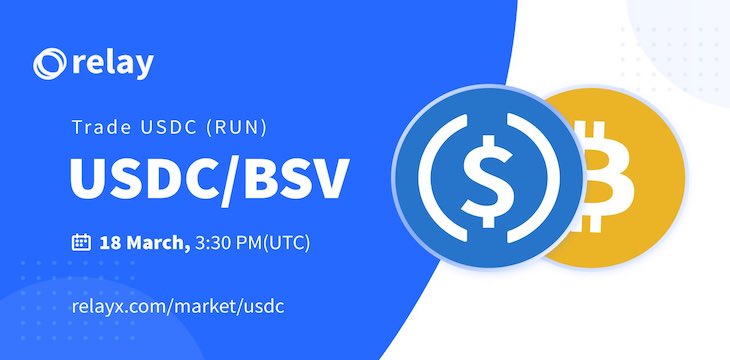|
Getting your Trinity Audio player ready...
|
RelayX’s decentralized exchange (REX) has a new stablecoin trading pair. Today, RelayX announced that they have listed a USDC/BSV trading pair on REX; this is the second trading pair to be listed on the exchange (SHUA/BSV was the first).
New Listing: USDC (RUN) https://t.co/POSmqgSOtJ
Bridge creation / withdraws of USDC ERC-20 to come pic.twitter.com/8sOE6aYgaD
— RelayX (@relayxio) March 18, 2021
USDC on BSV has actually existed for quite some time now. The RelayX team introduced USDC to the Bitcoin blockchain back in September. But adding USDC to REX simplified the process of obtaining USDC and it created an easy off-ramp for USDC holders.
Entering final phase of testing for USDC (RUN-SV).
— RelayX (@relayxio) September 26, 2020
The benefits of stablecoins
Stablecoins are useful because they allow you to escape the volatility that accompanies holding most digital currencies, yet, stablecoins give you an easy way to trade in and out of digital assets.
You can seek shelter in fiat when you are worried about the volatility in digital currency, however, converting to fiat is a taxable event, and the digital currency exchange you use to convert will charge a fee for the conversion.
If you would like to turn that fiat back into a coin or token, you must convert your fiat back into digital currency, which will also require you to pay a fee.
So instead of paying a fee to convert to fiat, paying taxes on your capital gains, and then a fee to convert back to fiat, you can simply trade your digital currency for USDC–which is pegged to the dollar. If you decide you want to own digital currency again, you can use REX’s BSV/USDC trading pair to re-enter.
By using a stablecoin, you eliminate the digital currency to fiat conversion fee, the taxable event, and the fiat to digital currency fee from the equation.
Why stablecoins on BSV make the most sense
The USDC stablecoin exists on many blockchains, but the fee associated with sending USDC is the lowest on the BSV blockchain.
“To issue $1.21 of USDC RUN to myself, the fee was 1,000 satoshis or 1/5 of a cent at $175 BSV,” said Joshua Henslee when he was testing USDC on the Bitcoin blockchain back in October.
“If I wanted to send $1.21 of USDC on Ethereum, the fee would be 0.009 ETH or $3.27 (at $364 Ethereum) – near triple the send amount.”
Now that ethereum is experiencing far more traffic than it was in early October, I would not be surprised if that fee to send USDC is even higher.
How to get USDC on BSV.
The USDC/BSV trading pair is live on REX, Bitcoin’s first fully decentralized, trustless, non-custodial, peer-to-peer DeFi order book.
To convert your BSV to USDC, or your USDC to BSV, head over to relayx.com/market.

 02-14-2026
02-14-2026 




